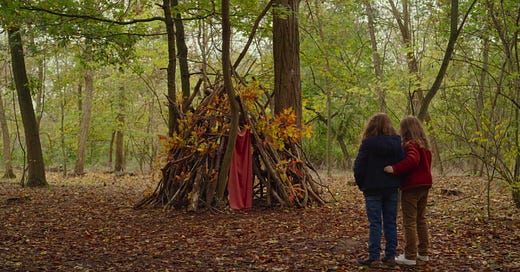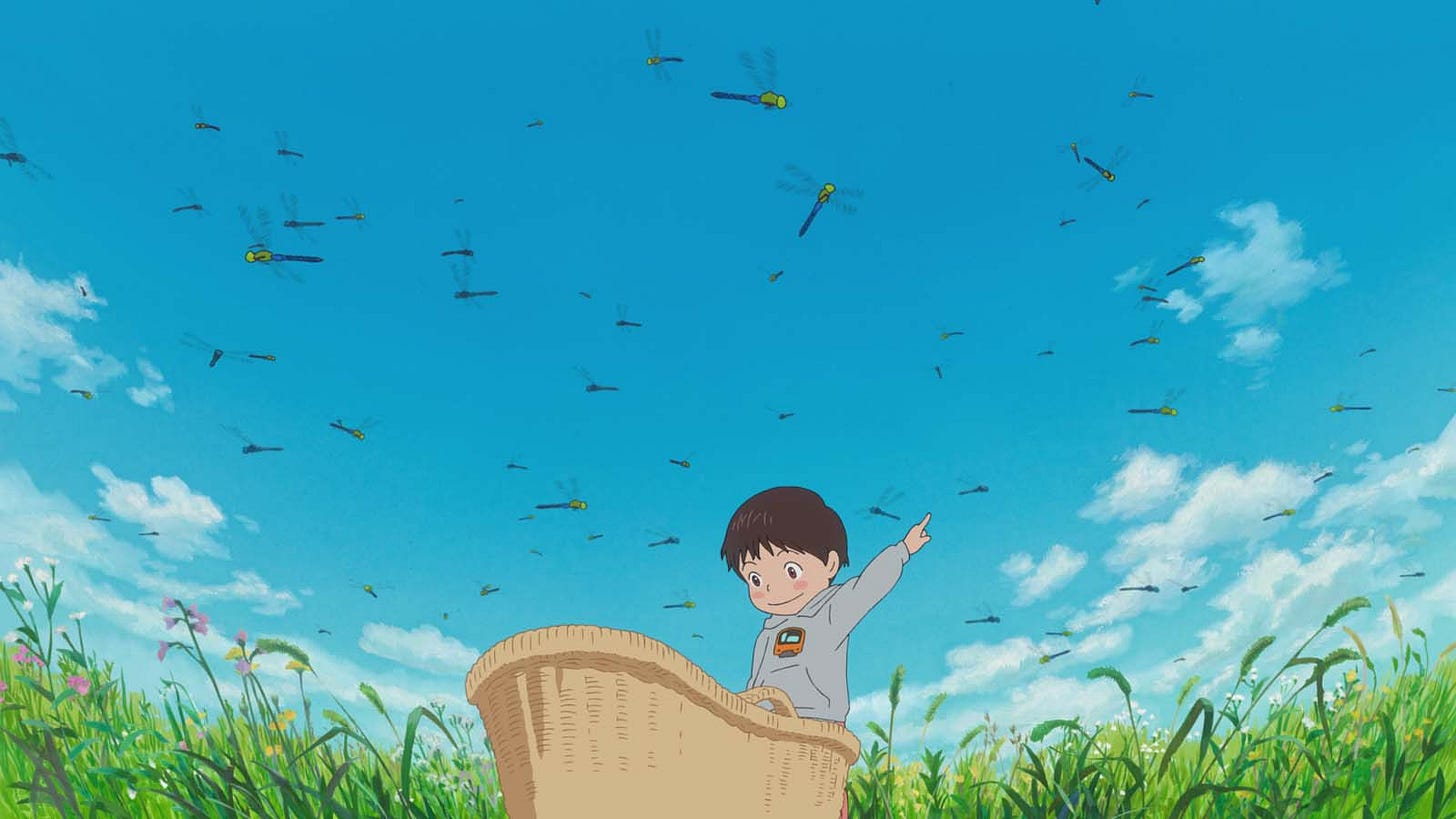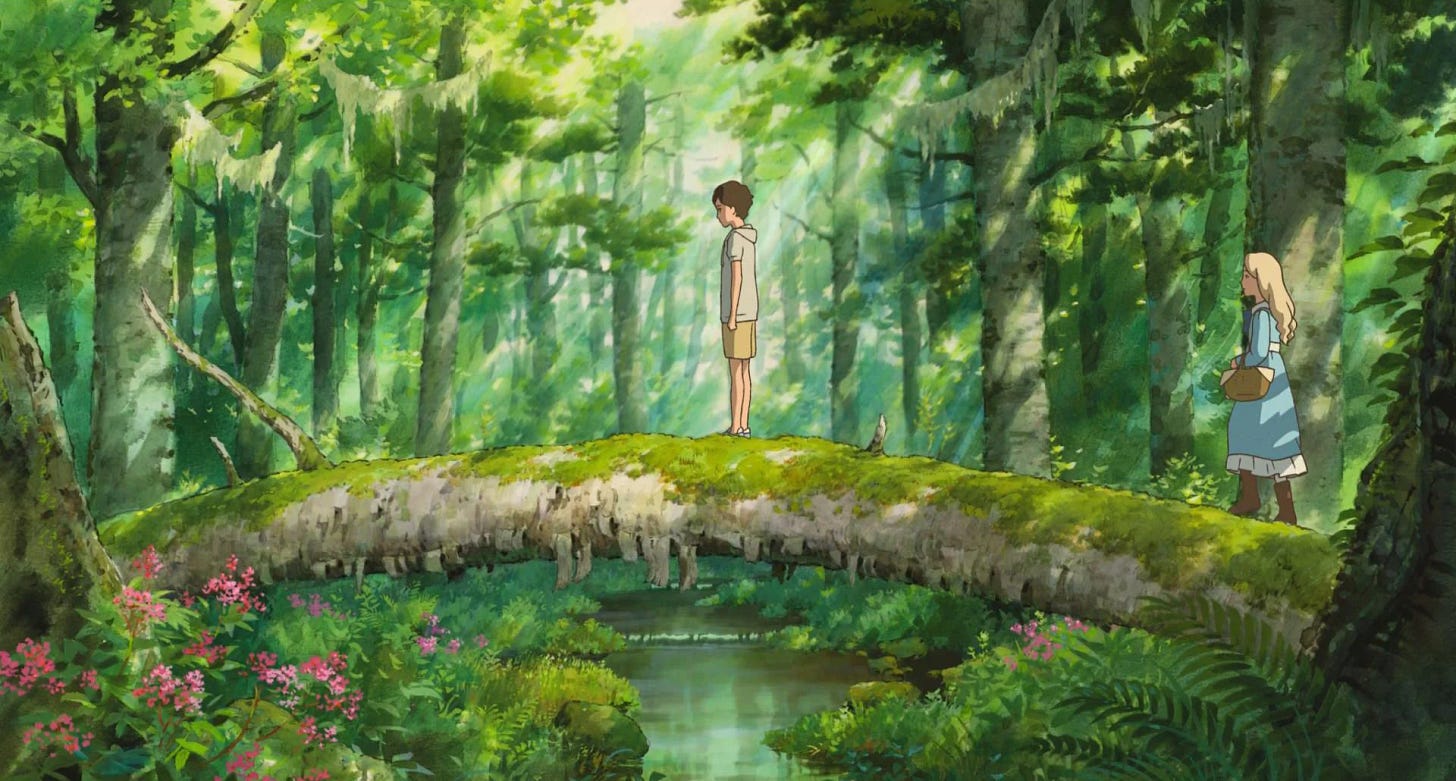Celine Sciamma's Petite Maman is a quiet little triumph. Suffused with warmth and gentleness, it tells the story of eight year old Nelly, who travels to her mother's childhood house following the death of her beloved grandmother. Nelly asks her mother about the hut in the backyard that she built as a child, nestled in between four trees. While there, she meets another girl her age named Marion.
Marion is the mirror image of Nelly, but neither of them comment on it. They found each other in the woods, a playmate and confidant. Marion's house also mirrors the house Nelly is staying in, with a few differences. It's the house Nelly's mother grew up in.
Nelly eventually realizes that Marion is her mother and they have a poignant conversation.
"I'm your child. Your daughter."
"You come from the future?"
"I come from the path behind you."
*
“Did I want you?”
“Yes.”
“I’m not surprised. I’m already thinking about you.”
Nelly reveals that Marion's mother dies when she is thirty one years old. Marion remarks that it's an old age.
Petite Maman made me imagine befriending my mother as a child. Although my own childhood home was ripe for a magical encounter like that, I'd meet her in Cape Verde, where we would do chores on her family's farm. I would get to see the handmade dolls her grandmother made for her, as well as the mischief she caused. Maybe even witness her and my aunt terrorizing their brother's cat (they tried sticking a pepper up its butt)! I could also meet my grandmother, who seems like a mythical figure. I've been told so many stories about her that sound too good to be true. The stories and a few photographs are all I have of her.
This would have been years before my mother's various heartbreaks, navigating a strange new country where she didn't speak the language with a small child all on her own.
I have seen pictures of my mom as a little girl. Her face still looks the same. In one her arms are crossed over her chest and she stares at the camera defiantly. My sister likes to joke that she was already a rude old lady as a child. Besides the photographs, it is hard to imagine her as a kid. I think it's the same for all of us. I cannot picture my father as a baby at all. So many years and experiences separate my mother and I, it's hard to think she ever felt the same things as me or even understands me. She nags me a lot and I can be very impatient with her.
And then at other times, I look at her and feel so sad. She's in her 70s. A lot of her loved ones have died. A few months ago, we visited one of her cousins who has been ill. He didn't even recognize me. Will that be me and my cousins in the future?
I wouldn’t tell my mother I was her daughter. But I’d want her to be thinking of me too, and to wish for me.
Petite Maman is described as a fairy tale of wonder and innocence. There's been quite an absence of sincere modern day fairy tales, so I'm really grateful this film in all its golden light and peaceful greenery exists.



There are three other films with the same theme of characters traveling back in time to meet their mothers or other family members as children. These are all animated films from Japan, but they remain wholly distinct from one another.
Mirai (2018) is one of my personal canon films. I managed to convince myself that it won Best Picture at the Academy Awards (and was quite shocked to see that wasn't the case). Four year old Kun has recently become a big brother and it's ruining his life! Baby sister Mirai is no fun at all. Kun is jealous and acts out, and his mother has no patience for any of it.
Dolls are set up for Hinamatsuri, or Girls Day, for Mirai's good luck. Kun's dad forgets to put them away, and as a result, 14 year old Mirai arrives from the future. If the dolls aren't put away, it'll add more years to her waiting time before she can marry. Kun also travels back in time and meets his mother as a 6 year old. At that age, she was just as difficult as Kun. Kun is also able to witness his family's history play out, how all of it led it to him.
Mirai hilariously and poignantly illuminates the chaos of parenthood and family life. Near constant battles are being waged by Kun and his parents, most notably his mother. I watch that film and feel my chest expand with warmth; that's the messy life I want. There are reviews of the film on Letterboxd that describe it as a great form of birth control. What severely impoverished imaginations those people have.
2014's When Marnie Was There explores childhood loneliness. Anna moves to the countryside for her health. Friendless and cared for by foster parents, she makes a new friend named Marnie who lives in a mansion overlooking the sea with her parents.
As the two get closer, their wounds reveal themselves. Marnie's parents are always traveling and she's mistreated by her nannies. Anna believes that her foster parents only care for her because they're paid to.
Marnie it turns out is Anna's grandmother. She was Anna's caretaker after the death of her parents, but she also died and Anna was sent to live with her foster parents. This film is so achingly beautiful. It might be Ghibli's most ethereal film.
The other Ghibli entry is The Boy and the Heron, Hayao Miyazaki's swan song from 2023 (or maybe not). This film isn't easily definable. It's complex even though there isn't a clear plot. There are moments of lucid beauty, like a rose falling through the air and shattering on the ground. The film is about Mahito, whose mother recently died in a fire. He and his father relocate to a new town, where his father's new wife Natsuko is expecting a baby. Mahito is pestered by a talking heron who tells him his mother is still alive. He journeys to a tower to search for her, a place filled with secrets and intricate passageways.
Mahito befriends Himi, a young girl with pyrotechnic ability who saves his life. Flocks of brightly colored birds crowd the film, posing a threat to our young hero and his friends. A mysterious man presides over the tower world, Natsuko's great uncle. He wants Mahito to be his successor, urging him to create a new world that is free from malice, one of bounty, peace, and beauty. Mahito refuses.
As he prepares to return home, Himi tells Mahito that she is going to grow up to be his mother.
The Boy and the Heron feels almost self-indulgent. I wonder at the story in Miyazaki's heart that he painstakingly translated onto film.
If I was to program a film festival, this would be my selection. Despite the simplicity and innocence, there is something remarkably profound about each of them. The inner lives of children aren't usually given the consideration they deserve. As if their feelings are primitive. With the exception of Mirai, grief or tragic events prompt their journeys of self discovery. They won't need to heal their inner child when they are older. Neither will that child be a separate person, no delineation of a younger ‘self.’
Maybe we’re not our ancestors’ greatest dream, but we might be the friends they needed.







